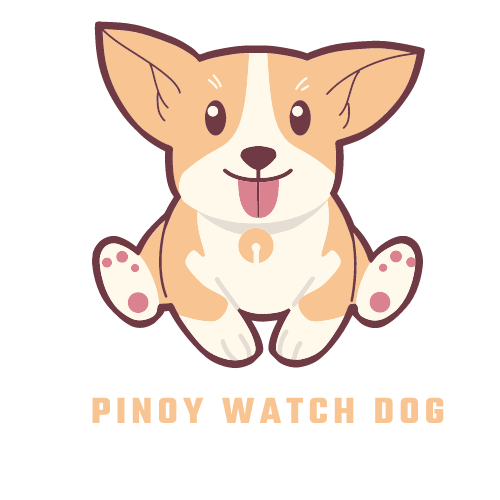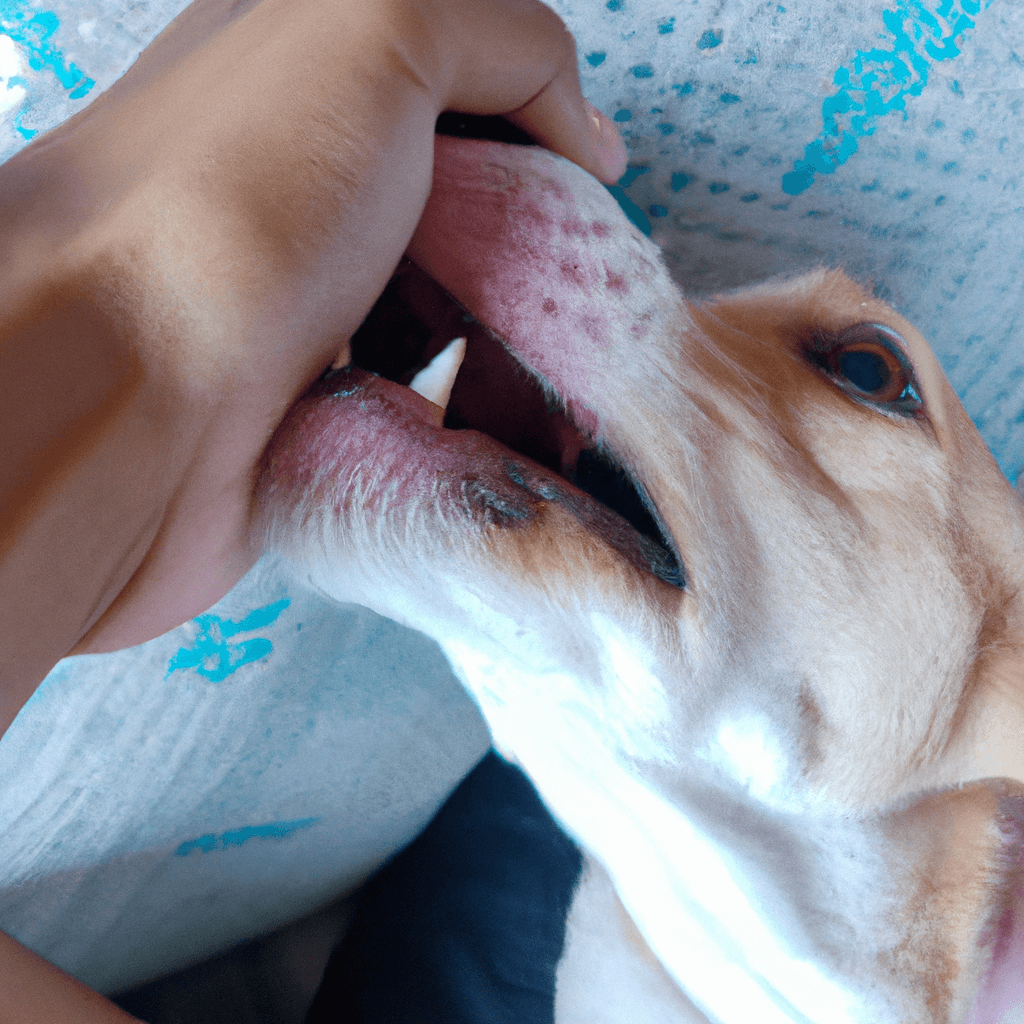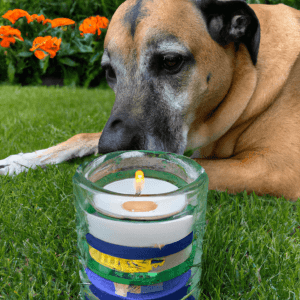Why do dogs nibble on you?
Dogs nibbling on their human companions can be a sign of affection and love. In the canine world, nibbling is a way to communicate, show dominance, or even to show love. It can be a sign of excitement, a way to get attention, or even a sign of boredom.
For some dogs, nibbling can be an enjoyable activity as well. Whatever the reason, it’s important to understand why dogs nibble on you so that you can prevent it from becoming a behavior problem.
Exploring the Different Reasons Why Dogs Nibble on People
Do you ever find yourself wondering why your pup loves to nibble on your fingers and toes? Dogs nibble on people for a variety of reasons, and understanding your pup’s behavior can help you manage it better. Here’s a look at some possible reasons your pup might be nibbling on you.
- Playfulness: Some dogs will nibble on fingers and toes to grab your attention, especially when they’re feeling playful. If this is the case, try redirecting your pup’s attention with a toy or engaging in a game of fetch.
- Teething: Puppies may nibble on people to soothe their gums and relieve the discomfort of teething. If this is the case, providing your pup with appropriate chew toys and plenty of frozen treats can help.
- Exploration: Dogs may nibble on people as a way of exploring their environment. Puppies are naturally curious and have a tendency to investigate new things with their mouths. If this is the reason for your pup’s nibbling, try redirecting their attention away from your hands and feet with a toy or treat.
- Hunger: Your pup may be nibbling on you because they’re feeling hungry. Make sure you’re providing your pup with a healthy diet and plenty of treats throughout the day.
- Affection: Some dogs like to nibble on people as a way of showing love and affection. If this is the case, try redirecting your pup’s attention with a toy or treat and let them know that it’s not acceptable to nibble on people. These are just a few of the possible reasons why your pup may be nibbling on you.
By understanding your pup’s behavior and providing them with appropriate outlets, such as toys and treats, you can help manage their nibbling behavior and ensure a happy and healthy relationship between you and your pup.
Is Nipping a Common Dog Behavior?
Yes, nipping is a common behavior among dogs, especially puppies. It’s usually done in play, but it can also be a way for them to communicate. Nipping is not always aggressive, but it can be uncomfortable or even painful for humans.
That’s why it’s important to teach your dog from a young age that nipping and biting are not acceptable behaviors. When puppies nip, it’s often seen as a form of play. This type of nipping is usually done with soft mouths and no teeth.
It’s important to remember that puppies have to learn how to interact with humans and other dogs, and nipping is a natural part of that process. It’s also common for dogs to nip when they’re feeling anxious or threatened.
If a dog is scared, it may nip as a way to protect itself. This type of nipping is usually more aggressive and can cause more pain. In order to discourage nipping, it’s important to be consistent in your training.
Whenever your dog nips, it’s important to give a strong “no” command and redirect their attention to something else. It’s also important to provide positive reinforcement when they follow commands and don’t nip. With consistent training, your dog will eventually learn that nipping is not an acceptable behavior.
Understanding the Reasons Behind Your Dog’s Nipping
If you have a dog, you know that nipping is a common behavior, especially in puppies. Nipping is when your pup bites or grabs onto clothes or skin with their teeth, and it can be concerning and even painful. But why do dogs nip in the first place?
Understanding the reasons behind your pup’s nipping can help you develop effective strategies to stop it. The most common reason for nipping is play. Dogs of all ages like to play, and sometimes this involves using their mouths.
Puppies, especially, explore the world with their mouths and don’t realize how sharp their teeth are. This can lead to nipping during playtime when your pup is trying to engage you in a game. Another reason why your pup might be nipping is fear.
If your pup is feeling scared or threatened, it may respond by nipping. This is an instinctive behavior for dogs, and it’s important to be aware of it. Finally, your pup might be nipping out of boredom.
Dogs need mental and physical stimulation to stay healthy and happy, and if they don’t get enough exercise and attention, they might start looking for ways to entertain themselves. This can include chewing on items or nipping at people.
Now that you know why your pup might be nipping, you can take steps to stop the behavior. Be sure to provide plenty of exercises and mental stimulation, like walks, training sessions, and interactive toys.
Also, give your pup plenty of positive reinforcement when they do something right, like sitting or coming when called. And, of course, always supervise playtime to make sure your pup isn’t nipping.
By understanding the reasons behind your dog’s nipping, you can develop an effective plan to stop the behavior. With patience and consistency, you can help your pup become the happy, well-behaved pup you know it can be.
What Can You Do to Stop Your Dog From Nipping?
If your dog is nipping, it is important to take proper steps to address the problem and stop it from happening. Here are some tips to help you stop your dog from nipping:
- Teach your dog to respond to commands such as “leave it” and “no bite.” Make sure to offer rewards when your dog complies.
- Provide your dog with plenty of toys and chew items to redirect its energy away from nipping.
- Ignore your dog when it nips, as this sends the message that it is unacceptable behavior.
- If the nipping is getting out of hand, use a time-out to give your dog a chance to calm down.
- Make sure to give your dog plenty of exercises to help it release energy in an appropriate manner.
- Take your dog to obedience classes to help it learn proper behavior. By following these tips, you can help to stop your dog’s nipping problem and turn it into a well-behaved pup!
How Can You Train Your Dog Not to Nibble?
Training your dog not to nibble can be a bit of a tricky task, but with patience and consistency, it is possible. Here are some tips to help you get started:
- Establish rules – Make sure your dog knows what they are allowed to chew on and what is off-limits. It’s important to be consistent and provide clear instructions, as this will help your pup understand what is acceptable and what is not.
- Provide acceptable chew toys – Give your dog a variety of chew toys to play with. This will help keep them occupied and give them an appropriate outlet for their nibbling behavior.
- Avoid punishment – While it’s important to be firm and consistent, punishing your dog for nibbling is not an effective solution. It will only create confusion and a feeling of insecurity for your pup.
- Redirect the behavior – If you notice your pup nibbling on something they shouldn’t, quickly redirect their attention to an acceptable chew toy or activity.
- Reward good behavior – Make sure to reward your pup when they obey your commands and do not nibble on things they shouldn’t. This will reinforce the behavior you want and make them more likely to follow your instructions in the future. By following these tips and being consistent with your training, you should be able to train your dog not to nibble. Good luck!
How Does Nipping Affect the Bond Between Dog and Owner?
Nipping is a common behavior that many dogs exhibit, and it can affect the bond between dog and owner. Nipping can be either a playful behavior or a sign of aggression and can be either a nuisance or a real danger.
When a dog nips its owner, it can cause physical pain and emotional distress. This can lead to a feeling of distrust between the owner and the dog. If the nipping continues, it can cause the owner to feel uncomfortable and even fearful of their pet, which can have a huge impact on the bond between the two.
Nipping can also be a sign of anxiety, which can be caused by a variety of factors. If the owner doesn’t address the underlying cause of the anxiety, then the nipping will continue. This can cause the bond between the owner and the dog to become strained, as the owner may feel like their pet is unruly or uncontrollable.
It’s important for owners to understand that nipping is a normal behavior for some dogs and it can be managed with proper training and positive reinforcement. If owners can understand why their dog is nipping and use positive reinforcement to discourage the behavior, then it can help to strengthen the bond between the two.
Nipping can affect the bond between dog and owner in several ways. If not managed properly, it can lead to feelings of distrust and even fear on the part of the owner. However, with proper training and positive reinforcement, nipping can be managed and the bond between the two can be strengthened.
Is Nipping a Sign of Aggression in Dogs?
Nipping is a common behavior in puppies, but it can also be a sign of aggression in older dogs. Nipping can be a way of communicating dominance, fear, or excitement. If your dog is nipping at you, it’s important to recognize the signs of aggression and address the behavior immediately.
Nipping is a normal behavior for puppies and is usually a sign that they are playing. Puppies often go through a teething phase during which they may use their mouths to explore their environment.
Nipping is usually harmless during this stage and can be managed with a firm “no” and by redirecting the puppy’s attention to an appropriate toy. However, if an older dog is nipping, it can be a sign of aggression.
If your dog is nipping at you, it’s important to take note of the context. Is your dog nipping when you try to take away a toy or a treat? Is your dog nipping when you try to put them in its crate?
If so, your dog may be trying to assert dominance or protect their resources. It’s also important to look for other signs of aggression, such as growling, snarling, or baring teeth. If your dog is exhibiting aggressive behavior, it’s important to seek the help of a qualified trainer or behaviorist to address the issue.
In summary, nipping can be a normal behavior in puppies, but it can also be a sign of aggression in older dogs. If your dog is nipping, it’s important to take note of the context and look for other signs of aggression. If you’re concerned about your dog’s behavior, it’s important to seek help from a qualified trainer or behaviorist.
Does Nipping Have Any Benefits for Dogs?
Yes, nipping can have some benefits for dogs when done in the right way. Properly supervised and controlled nipping can help to teach dogs appropriate behavior and provide mental stimulation.
Nipping can help teach puppy limits and boundaries. When puppies are nipping, they are learning how to interact with people, other animals, and their environment. When nipping is done in a controlled way, it can help puppies learn not to bite too hard or too frequently.
In addition to teaching puppies limits, nipping can also provide mental stimulation. Dogs that have a lot of pent-up energy may tend to nip more often, but using nipping as a form of play can help them release some of their energy and stay mentally active.
It can also be a good way to get them to focus on a task, such as fetching a toy or learning a trick. Finally, nipping can help to build a bond between a dog and its owner. When done in a safe and controlled manner, nipping can be an enjoyable activity for both the dog and its owner.
This can help to strengthen the bond between them, as well as encourage the dog to be more confident and outgoing. Overall, nipping can be beneficial for dogs when done properly. It can help to teach puppies boundaries, provide mental stimulation, and build a strong bond between dogs and their owners. However, it’s important to remember to always supervise and control any nipping to ensure it’s done safely and appropriately.
Dogs often nibble on humans as a sign of affection and to show they are happy. They may also be trying to get attention or show excitement. Nuzzling, licking and nibbling can all be signs of love and is a way for them to show how much they care. So, next time your pup nibbles on you, take it as a sign of their love and appreciation for you.




